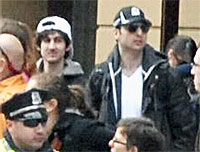For Tsarnaev Brothers, Family Model Broke Down

(Moscow Times – themoscowtimes.com – Ivan Nechepurenko – April 23, 2013)
As more details surfaced Monday regarding the complex family history of the Tsarnaev brothers, suspected of detonating deadly bombs at the finish line of the Boston Marathon, the traditions of Caucasian families became a focus of inquiry into why Tamerlan and Dzhokhar may have turned into terrorists.
The Tsarnaev family moved from Kyrgyzstan to Dagestan in the 1990s and then to the United States in the early 2000s, apparently struggling to fit into a wide array of societies. In recent years, the parents of the two suspects moved back to Makhachkala, the capital of the Republic of Dagestan, leaving their children in the U.S.
With these moves and separations, the traditional Caucasian family model appears to have broken down, likely contributing to the brothers’ sense of unease and isolation, Caucasus experts said.
“A Caucasian family is a fortress that has to have all its elements stuck together permanently,” said Maierbek Vatchagayev, president of the Association of Caucasian Studies in Paris.
“With regard to the Tsarnaev family, I can see that this structure was cracked, since in the U.S. the family was under the pressure of a Western culture that is often at odds with ancient Caucasian traditions,” Vatchgayev said.
The younger brother, Dzhokhar, was in the hospital in critical condition Monday after being captured by police over the weekend. He reportedly began communicating with the authorities in writing, being unable to speak due to a throat injury, but there have been no reports about what he has said. His brother Tamerlan was killed in a shootout with police.
Friends and classmates of Dzhokhar have described him as easygoing and seemingly well-adjusted in the U.S., making it difficult to fathom why he would follow his apparently more troubled brother Tamerlan in the bombings scheme.
But the brothers’ mother told ABC news that “what Tamerlan said was law for Dzhokhar.”
Caucasian families are typically governed by a patriarchal model, and the younger brother’s loyalty to his elder sibling may have been strengthened by the pair’s separation across an ocean from their parents.
“The traditional Chechen family model makes the father the absolute head of a family. In case the father is away, the older brother runs the affairs,” said Abdullah Duduyev, the editor of the Caucasus-focused magazine Dosh.
Patimat Suleimanova, an aunt of the brothers, said Dzhokhar planned to visit his parents in Dagestan in May. “They adored their parents and missed them very much. They knew that paradise lays at the mother’s feet,” she said in an interview with RT.
Tamerlan struggled to find his identity while trying to reconnect with his Chechen roots during a trip to Dagestan and Chechnya last year, Suleimanova told The Associated Press on Monday.
But their father, Anzor, told the news agency that he encouraged Tamerlan not to stay in Russia, recommending that he return to the U.S. and seek citizenship. Tamerlan went back in July but was apparently planning to move to Dagestan with his child and American wife, who had converted to Islam.
That would seem to go against his father’s advice, breaking the code of subordination.
“When Chechen boys wanted to ‘go in to the forest'” a widely used term for joining the insurgency “they would still ask their parents’ permission to do so. This rule was always absolute,” Duduyev said.
Anzor Tsarnaev has apparently been a man out of place for much of his life as well, leading his family on various moves around the world and settling in Dagestan, an unusual home for a Chechen.
“The fact that the father [Anzor Tsarnaev] decided to settle in Makhachkala is very telling you can hardly find a single Chechen living there,” Vatchagayev said. “It means that he couldn’t fit into Chechnya and did not have many connections there.”
In 1999, a group of Chechen militants invaded neighboring Dagestan to establish an Islamic republic unifying the two lands. The invasion led to a full-scale military offensive by Russian troops that year, with a guerrilla war lasting officially until 2009 that resulted in the almost complete devastation of Chechen territory.
“This family was trying to settle in a number of places but could not properly assimilate anywhere,” Vatchagayev said. “At the same time, they could always refer to Chechnya, which is seen as a land of noble knights and as a fairy-tale island by many Chechens who have never lived there.”
In the United States, the Tsarnaev brothers had an uncle, Ruslan Tsarni, and while uncles in Chechnya are traditionally on equal footing with mothers and fathers in terms of their authority over their nieces and nephews, the brothers had not seen him for over five years.
Tsarni has said this was due to his displeasure with the way they were brought up by his brother Anzor. Tsarni has said he was also appalled that Tamerlan, who had become a more devout Muslim, objected to the way he practiced Islam.
